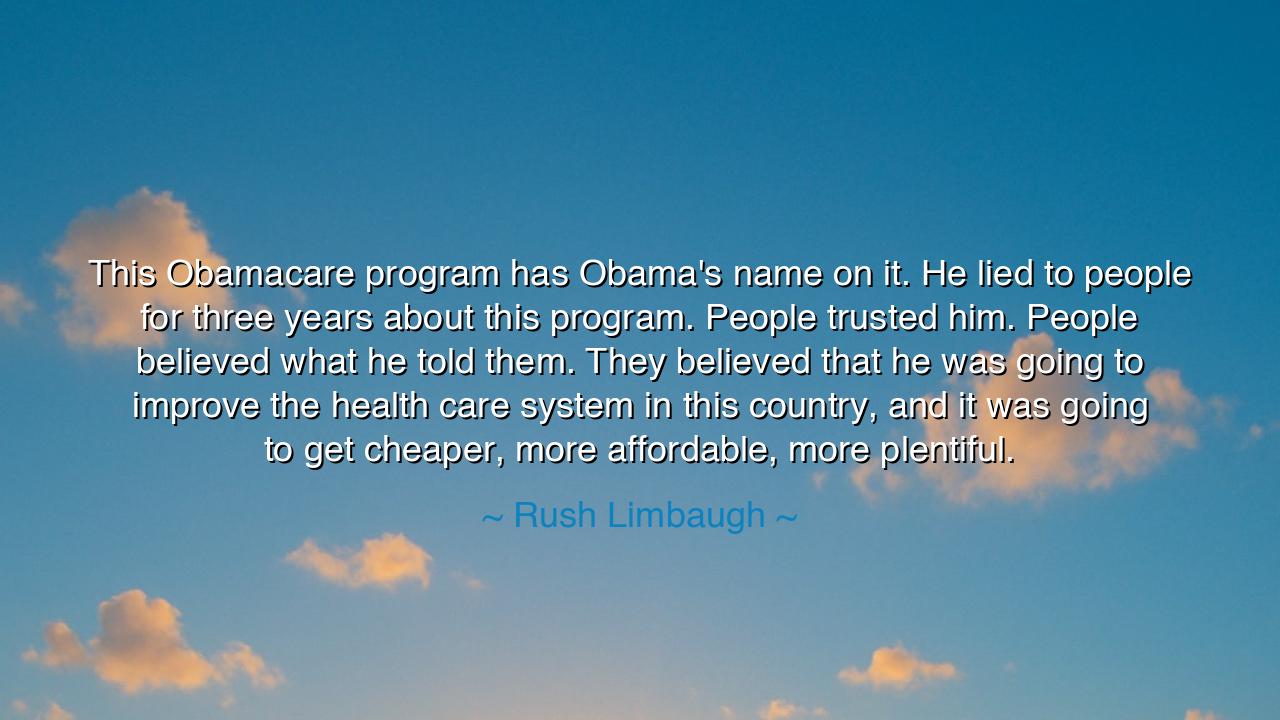
This Obamacare program has Obama's name on it. He lied to people
This Obamacare program has Obama's name on it. He lied to people for three years about this program. People trusted him. People believed what he told them. They believed that he was going to improve the health care system in this country, and it was going to get cheaper, more affordable, more plentiful.






The words of Rush Limbaugh — “This Obamacare program has Obama’s name on it. He lied to people for three years about this program. People trusted him. People believed what he told them. They believed that he was going to improve the health care system in this country, and it was going to get cheaper, more affordable, more plentiful.” — are not merely the accusations of a critic; they are the lament of a people disillusioned. They echo the ancient sorrow of citizens who once believed in promises radiant with hope, only to see them darkened by the weight of reality. In these words, Limbaugh strikes at a timeless theme: the fragility of trust between ruler and ruled, and the pain that follows when that trust is broken.
From the dawn of civilization, trust has been the foundation of governance. In Athens, it was said that democracy was not built on marble but on faith in the word of men. When leaders spoke, their honor was their bond. When that bond was broken, nations trembled. In ancient Rome, when Caesar crossed the Rubicon, he did not merely betray a senate — he betrayed a people’s faith in the order of their world. So too, in Limbaugh’s words, we hear the echo of that eternal warning: when truth is bent for ambition, even noble causes rot from within.
Obamacare, or the Affordable Care Act, was born from vision — a vision of healing a nation’s wounds, of giving the sick and the poor a fair chance at life. It promised affordability, accessibility, and abundance. Yet as with all grand visions, its path was marred by human imperfection. Where the shepherd fails to speak plainly to his flock, confusion breeds distrust. Where the promise of plenty is met with the price of burden, faith turns to fury. Thus, the health of a nation — both physical and moral — becomes endangered, not by illness alone, but by disillusionment.
Limbaugh’s words are fierce, but their core is the cry of accountability. He reminds us that leadership without transparency becomes tyranny in disguise. Throughout history, the greatest wounds inflicted upon societies were not by foreign swords, but by domestic deception. Consider the fate of the people under King Louis XVI, who assured France that prosperity was near while famine crept through the villages. The people’s faith, once betrayed, became the fire that consumed a kingdom. In the same spirit, Limbaugh’s accusation is not merely political — it is moral. He speaks as one who fears that truth has been traded for legacy.
Yet even in outrage, there lies a hidden wisdom. The purpose of criticism is not destruction, but correction. A free people must never be so blinded by love of a leader that they forget their duty to question him. In ancient China, Confucius taught that a wise ruler welcomes honest counsel, for flattery corrupts the throne, but truth preserves it. Thus, the anger of Limbaugh and those he represents may be seen not as hatred, but as a demand for integrity — the call of a people who desire not perfection, but honesty.
The lesson, then, is not confined to one president or one law. It belongs to all who govern and all who follow. Promises are sacred oaths, and every word spoken in power binds the speaker’s soul to the destiny of the people. When those words prove false, a fissure opens between leader and nation — a wound that no policy can heal. Only truth, spoken humbly and lived faithfully, can restore that bond.
So, my child, remember this ancient counsel: do not place blind faith in the tongues of men, but in the light of truth itself. Question with courage, believe with wisdom, and hold those in power to the promises they make. For a nation that forgets how to demand truth will one day awaken to find that its freedom has withered in silence. The true measure of leadership lies not in words that please, but in deeds that endure — for truth is the foundation of all trust, and trust is the lifeblood of civilization.
And so the teaching of this quote resounds through time: the people’s belief is the greatest treasure of any leader — once lost, it cannot be bought back with gold or glory. Therefore, let truth be spoken plainly, even when it wounds, for only in honesty can a nation remain whole, strong, and free.






AAdministratorAdministrator
Welcome, honored guests. Please leave a comment, we will respond soon